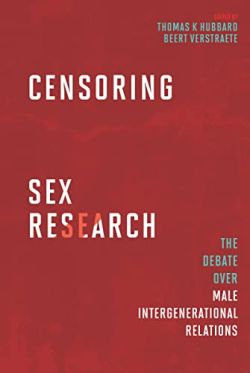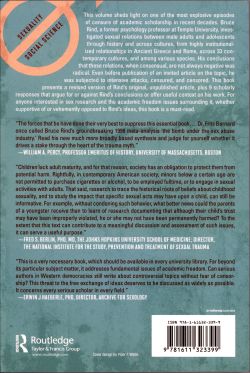Censoring Sex Research
Jump to navigation
Jump to search


Censoring Sex Research: The Debate over Male Intergenerational Relations is a 2013 book consisted of Rind's research on evolutionary origins of male intergenerational sexuality and several related articles compiled by editors Thomas K. Hubbard and Beert Verstraete.
Description of the book from a review by Diederik Janssen[1]:
- “Thomas K. Hubbard and Beert Verstraete’s edited volume, Censoring Sex Research, has had a tormented history. The volume responds to the widely bemoaned exclusion of psychologist Bruce Rind’s transdisciplinary contribution on “Greek Homosexualities” to the special issue of The Journal of Homosexuality in 2005 (then published by Haworth) and subsequent dismissal from the journal in 2010 (by its successor publisher Taylor & Francis). The affair echoed an unprecedented denouncement in 1999 by the U.S. Congress of the findings of a meta-review by Rind and others on supposed corollaries of “child sexual abuse” (CSA). Calculated to rouse the ire of conservative watchdogs,[1] a preview abstract to Rind’s 2005 article promised “an evolutionary model that synthesizes the empirical, cross-cultural, and cross-species data” on pederastic relationships, with animal data suggesting that “the seeds for pederasty were planted at the dawn of humanity.”[2]
- Censoring Sex Research unfolds Rind’s mentorship-bonding/enculturation-alliance hypothesis in an extended lead essay, the product of several augmentations and rounds of commentary. Elaborating on extant biosocial proposals, Rind suggests that, as a “recurring behavioral pattern,” pederasty is “presumably genetic, the result of primate heritage, natural selection, and pederasty’s functional utility in the EEA [Environment of Evolutionary Adaptedness]” (p. 72). Rind argues that pederastic infatuations greased the enculturation of boys into big game hunting and warfare, resulting in overall group cohesion and survival. Where persistent, they should be considered consequential to a vestigial sensitivity, not an idiopathic dysfunction.
- The book’s other contributions provide necessary (in any case courageous) lamentations on Anglo-American sexual culture but show only variable adherence to the themes of its title and subtitle. Two chapters present case studies on censorship in relation to “age-discrepant” sex (Patrick O’Neill and Janice Best, and Richard Yuill). Complementing Rind’s chapter, another by Don Mader and Gert Hekma provides a useful historical overview and appreciation of “pederastic” age distributions within “gay” history. Two further chapters present extended and chilling impressions of contemporary U.S. punitive sex laws and policy around minors (Andrew Heller and Hubbard).[3] Richard McAnulty and Lester Wright Jr.’s chapter continues an older legacy of methodological objections to Rind’s focus on CSA. Rind’s hypothesis is only directly addressed in the chapters by biologist Eric Alcorn and sociologist David Greenberg. The book concludes with Rind’s reply to McAnulty and Wright (debating the admissibility of biographic anecdote).”
Description on Amazon[2]:
- "This volume sheds light on one of the most explosive episodes of censure of academic scholarship in recent decades. Bruce Rind, a former psychology professor at Temple University, investigated sexual relations between male adults and adolescents through history and across cultures, from highly institutionalized relationships in Ancient Greece and Rome, to 33 contemporary cultures including the USA, and among various species. His conclusions that these relations, when consensual, are not always negative was radical, but based in his research findings. Even before publication of an invited article on the topic, he was subjected to intensive attacks, censured, and censored. This book presents a substantially extended version of Rind’s original, unpublished article, plus 12 scholarly responses to his work that argue for or against Rind’s conclusions or offer useful context on his work. For anyone interested in sex research and the academic freedom issues surrounding it, whether supportive of or vehemently opposed to Rind’s ideas, this book is a must-read."
Chapters:
- Introduction, by Thomas K. Hubbard
- 1. Pederasty: An Integration of Empirical, Historical, Sociological, Cross-Cultural, Cross-Species, and Evolutionary Perspectives, by Bruce L. Rind
- 2. More Speech or Less? Censoring Social Science, by Patrick O'Neill and Janice Best
- 3. Intergenerational Sexualities: A Case Study on the Colonisation of Late Modern Sexual Subjects and Researcher Agendas, by Richard Yuill
- 4. Two Personal Perspectives, by Walter L. Williams
- 5. Intergenerational Relationships in Java and Thailand, by Walter L. Williams
- 6. Blinded by Science: A Critique of Rind's Views on Pederasty, by Richard D. McAnulty and Lester W. Wright, Jr.
- 7. Review and Critique of the Empirical Methodology Employed by Bruce Rind, by L. Eric Alcorn
- 8. Same Sex, Different Ages: On Pederasty in Gay History, by D. H. Mader and Gert Hekma
- 9. "Here's To You, Mr. Robinson": Men Who Have Sexual Relations with Male Minors, by David F. Greenberg
- 10. Harming Children in the Name of "Child Protection": How Minors Who Have Sex with Other Minors are Abused by the Law andTherapy, by Andrew Heller
- 11. The Sex Offender System: Punishing homo sacer, the New Internal Enemy, by Thomas K. Hubbard
- 12. Blinded by Politics and Morality-A Reply to McAnulty and Wright, by Bruce L. Rind
See also
- Research: Intergenerational Sexual Behaviors in Animals
- Research: Intergenerational Relationships in History
- Research: Nonwestern Intergenerational Relationships
- Research: Evolutionary Perspectives on Intergenerational Sexuality
External links
Download:
- "Censoring Sex Research" on Libgen
- The first chapter "Pederasty: An Integration of Empirical, Historical, Sociological, Cross-Cultural, Cross-Species, and Evolutionary Evidence and Perspectives" on Greek-Love.com